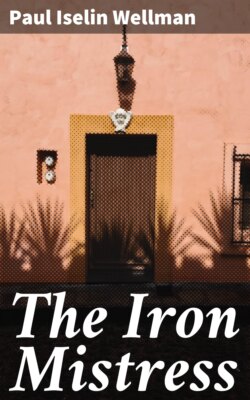Читать книгу The Iron Mistress - Paul Iselin Wellman - Страница 37
На сайте Литреса книга снята с продажи.
1
ОглавлениеTable of Contents
Audubon was awake and reading. “How was the ball?” he asked.
“Very fine.”
“Monsieur de Bornay?”
“Kind.”
“Madame?”
“Gracious.”
“And Mademoiselle?”
“Wonderful!”
Audubon filled a long-stemmed clay pipe and began to smoke. “Tell me about it.”
“She is charming and generous.”
The artist contemplated him and puffed on his pipe.
Bowie said, “I have good news for you.”
“Yes?”
“You’re to paint her portrait after all.”
“I am truly astonished!”
“She regrets the unpleasantness,” said Bowie, “and asks that you come to her house this afternoon.” He paused. “That should tell you what she’s like.”
“She asked thee to convey this message?”
“Yes.”
“At her own instance?”
“Assuredly. I may have made some small suggestion——”
A long silence. Then Audubon said, “My poor James.”
“What ails you?” Bowie felt displeasure.
“I foresee great peril for thee.”
“From these Creoles? I fear them not a fly.”
“Nay, thee can take care of thyself well enough among men. But——”
“But what?” snapped Bowie impatiently.
“A woman is another story.”
“Explain yourself.”
“I do believe thee smitten with Mademoiselle de Bornay.”
“You talk like an idiot!”
“Even an idiot could see these symptoms,” Audubon said.
Bowie reddened. “Well—is there anything wrong with her?” he asked less violently.
“Concerning Mademoiselle I have nothing to say. She is as God made her. But concerning thee I feel most gravely.”
“I’m listening.”
“This girl is of a different world from thine, James. However desirable a woman may appear, a man who is shaping his career should think strongly before setting his mind on her.”
Bowie gave a gruff, short laugh. “If I had any such notions as you suggest—do you reckon she’d think a second time about a bayou man, with no money or prospects, when she can choose from the wealth and family of all New Orleans?”
“May I speak with candor, James?”
“You seem to be doing it already. Keep right on.”
“Women sometimes love to play with men. Thee has small experience of the fair sex, my friend. And this one—I think she would require very much experience to cope with—and perhaps even something beyond——”
“As what?”
“Perhaps—ruthlessness. A kind of ruthlessness thee do not possess—a kind of ruthlessness I hope thee may never possess—for it means disillusion.” Audubon was solemn. “I mark a change in thee, James.”
Bowie, unsmiling, waited.
“Thee were a hunter, strong, little caring for foppery or the other superficialities that pass for important in this hive of superficiality. Now I see thee affecting the airs and garments of—well, at least a would-be dandy.”
With the peculiar vanity of young men, Bowie found that the “would-be” rankled in his mind.
“I reckon you’d rather have me in linsey or leather?” he grumbled.
“The fop is never respected: the dandy is never a leader of men.”
Bowie grunted at that, but Audubon grew more earnest.
“I would not trade thee, James, for ten thousand Philippe Cabanals or even for many Narcisse de Bornays, although Narcisse is much more the man than Philippe. I am an American, yet I was not so born. I am proud that I am now.” He took three quick, nervous puffs at the clay pipe. “America is of all nations the youngest, with the greatest destiny. One must know the old, tired countries of Europe fully to understand this. Among nations America is like unto thee, James, among these elegants of New Orleans—unvitiated by the degeneracies of civilization, yet surrounded by a generation of evil, decadence, and dishonor, riddled by diseases of both the body and soul.”
Slowly Audubon knocked the ashes out of his pipe, and placed the long-stemmed clay on the table.
“The nearer man approaches the essentials, James, the nearer he comes to the ideal. Is not nature the prime essential, the beginning?”
For the moment at least Bowie could find no argument against that.
“Does it not follow then,” said Audubon eagerly, “that the nearer a man lives to nature, the nobler his spirit must become? Observe the savage of the American wild. The closer he approaches the white man’s civilization, the more debased he is. Dishonesty, gross appetites, immorality, disease, the whole gamut of degenerative influences work out their will on him. But the red man in his forest, or far out on his plains, is as God intended—splendid, worthy of love and admiration.”
Bowie privately considered that the few Indians he had encountered in Louisiana undoubtedly possessed all the disabilities Audubon named, with poverty and dirt added. On the other hand, his father used to tell of sufficiently wild Indians against whom he had fought in Kentucky—and the old man had small respect for them either.
“Return to thy forest, James!” Audubon said. “With rifle in hand and thy eye on the wilds, thee will be closer to perfection than ever in this city, turning out thy toes like a French dancing master and practicing the mincing macaroni ways.”
Bowie thought the dig about turning out his toes rather hard, but he only said, “If I did as you say, what would happen to your commission for the portrait of Mademoiselle de Bornay?”
“I should lose it again.”
“It means nothing to you.”
“It means everything.”
“Then rest happy. I’m not taking your advice.” Bowie grinned.
They undressed. He blew out the candle and rolled into bed.
After a time he chuckled in the dark.
“What amuseth thee?” came Audubon’s sleepy voice.
“You overlooked one big disadvantage in what you call the ‘macaroni way.’ ”
“What is that?”
“Getting used to the clothes. It would be an injustice to Cocquelon to say that my new pantaloons fit me tight as my skin. They fit tighter. When I pulled them off just now, my legs looked like fluted pillars, grooved with the cords of the garment they have worn this day.”
